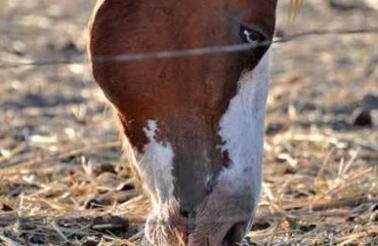
Ribs stand out on the sides of the horses, donkeys and mules falling victim to unrelenting drought in Texas. Once grassy fields are bare earth. When hay can be found, the price is double or triple last year’s tally, when feeding a horse cost $150 to $200 a month.
In 2007, before the economy hit the skids, Texas reported 438,827 horses. Some were owned by cattle ranchers, others by recreational riders. No one knows what the tally is now. With no interested buyers and no money to pay for their feed, many of the state’s iconic horses are being abandoned.
While most horse owners continue to care for their animals, a growing number are just trucking them to other counties and dropping them off. Abandoning horses is a crime, so owners hope for the anonymity of distance. Safe Haven Equine Rescue in Gilmer, Texas gets 20 to 40 calls a week about horses wandering the roadside. That’s up from 3 or 4 calls a week last year.
Donkeys and mules are being abandoned too. Animal rescue groups, such as California-based Peaceful Valley Donkey Rescue, have never seen so many animals left to fend for themselves as cash-strapped owners turn them loose. From March to September 2011, the rescue center took in 500 donkeys, 100 more than in all of 2010.
With most of the winter still ahead and no assurance next year will bring rain, ranchers are having to ship hay from as far away as Oregon and Idaho. The temporary boon for farmers in those states is no assurance the supply will last as long as the need.
News of the plight of Texas horses comes as Congress has lifted the ban on equine slaughterhouses. The last one in the U.S. closed in 2007 in Illinois. Animal welfare activists promise a massive campaign if any new ones open.
Currently, ranchers ship horses that are old or unfit for work, or maybe just unwanted, to slaughterhouses in Canada and Mexico. Last year 138,000 were shipped, but even carnivores in the U.S. are reluctant to see equines slaughtered for pet food or human consumption, at least if it happens on home ground.
As their owners struggle with mounting debt and disappearing income, horses and donkeys become an impossible expense. The fate of these equines is more than an economic issue. It is also a moral issue and not one with easy answers.
Courtesy of http://www.care2.com

